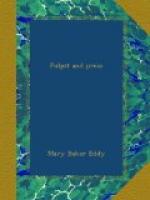Mrs. Eddy talked earnestly of her friendships.... She told something of her domestic arrangements, of how she had long wished to get away from her busy career in Boston, and return to her native granite hills, there to build a substantial home that should do honor to that precinct of Concord.
She chose the stubbly old farm on the road from Concord, within one mile of the “Eton of America,” St. Paul’s School. Once bought, the will of the woman set at work, and to-day a strikingly well-kept estate is the first impression given to the visitor as he approaches Pleasant View.
She employs a number of men to keep the grounds and farm in perfect order, and it was pleasing to learn that this rich woman is using her money to promote the welfare of industrious workmen, in whom she takes a vital interest.
Mrs. Eddy believes that “the laborer is worthy of his hire,” and, moreover, that he deserves to have a home and family of his own. Indeed, one of her motives in buying so large an estate was that she might do something for the toilers, and thus add her influence toward the advancement of better home life and citizenship.
* * * * *
[Boston Transcript, December 31, 1894]
[Extract]
The growth of Christian Science is properly marked by the erection of a visible house of worship in this city, which will be dedicated to-morrow. It has cost two hundred thousand dollars, and no additional sums outside of the subscriptions are asked for. This particular phase of religious belief has impressed itself upon a large and increasing number of Christian people, who have been tempted to examine its principles, and doubtless have been comforted and strengthened by them. Any new movement will awaken some sort of interest. There are many who have worn off the novelty and are thoroughly carried away with the requirements, simple and direct as they are, of Christian Science. The opposition against it from the so-called orthodox religious bodies keeps up a while, but after a little skirmishing, finally subsides. No one religious body holds the whole of truth, and whatever is likely to show even some one side of it will gain followers and live down any attempted repression.
Christian Science does not strike all as a system of truth. If it did, it would be a prodigy. Neither does the Christian faith produce the same impressions upon all. Freedom to believe or to dissent is a great privilege in these days. So when a number of conscientious followers apply themselves to a matter like Christian Science, they are enjoying that liberty which is their inherent right as human beings, and though they cannot escape censure, yet they are to be numbered among the many pioneers who are searching after religious truth. There is really nothing settled. Every truth is more or less in a state of agitation. The many who have worked in the mine of knowledge are glad to welcome others who have different methods, and with them bring different ideas.




